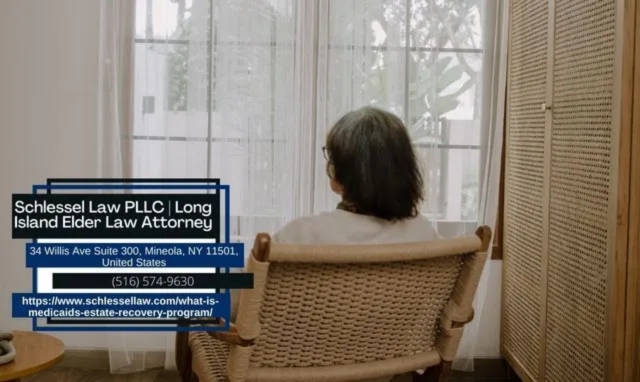Seth Schlessel (https://www.schlessellaw.com/what-is-medicaids-estate-recovery-program/), a Long Island Medicaid planning attorney at Schlessel Law PLLC, recently shared critical insights into Medicaid’s Estate Recovery Program. In a detailed article, Schlessel outlines how Medicaid’s Estate Recovery affects individuals and families, particularly in the context of estate planning. Medicaid, a program designed to assist low-income individuals with healthcare costs, also has provisions that allow the government to recover funds spent on a beneficiary’s care after they pass away.
Long Island Medicaid planning attorney Seth Schlessel emphasizes the importance of understanding this program for those who rely on Medicaid to cover their long-term care expenses. “Many people are unaware that Medicaid may seek reimbursement from their estate after they pass away,” Schlessel explains. This process, known as estate recovery, can come as a surprise to beneficiaries who may not have anticipated the government claiming part of the estate they intended to leave to their heirs.
Schlessel, a Long Island Medicaid planning attorney, elaborates on the specific rules governing estate recovery in New York. Under federal law, states are required to attempt recovery of Medicaid costs from the estates of beneficiaries who were 55 or older at the time they received long-term care. However, the law allows for some exemptions and limitations based on the size and nature of the estate, as well as on the circumstances of the surviving family members. “There are certain exemptions that can protect an estate from full recovery,” Schlessel points out, “but these exemptions are not automatic and must be carefully accounted for as part of an overall Medicaid planning strategy.”
One of the key topics discussed in the article is how Medicaid planning, particularly in the Long Island region, can play a crucial role in minimizing the impact of the Estate Recovery Program on a family’s assets. Schlessel notes that many individuals delay planning for Medicaid coverage, only to face potential asset recovery claims after it is too late to shield their estate. “It’s important to begin planning early,” says Schlessel, “as proactive strategies such as creating trusts or other legal instruments can help ensure that a person’s estate is preserved for their loved ones, rather than being depleted by recovery claims.”
In the article, Long Island Medicaid planning attorney Seth Schlessel highlights some of the common methods available to help mitigate the risks of estate recovery. One common approach is the use of irrevocable Medicaid trusts, which can protect assets from Medicaid estate recovery while still allowing individuals to qualify for long-term care benefits. Schlessel explains that these types of trusts must be carefully structured and managed to comply with Medicaid rules, but they can provide a significant layer of protection for assets that a person intends to pass on to their heirs.
Schlessel also addresses the complex nature of the look-back period for Medicaid eligibility, another critical element of planning. This period allows Medicaid to review financial transactions made within a certain time frame before an individual applies for benefits. Transactions that fall within the look-back period can affect eligibility and increase the chances of recovery from an estate after the individual’s death. “The look-back period is a challenge for many families,” Schlessel states. “Understanding how it works is essential for protecting your estate from recovery efforts.”
For families who may be facing an estate recovery claim after the death of a loved one, Schlessel outlines some options for delaying or avoiding recovery. The Long Island Medicaid planning attorney points out that surviving family members can sometimes request hardship waivers, which prevent Medicaid from collecting against the estate if recovery would cause undue financial hardship to the surviving relatives. These waivers can provide much-needed relief, but they require detailed documentation and proof of hardship, making it essential to work with a Medicaid planning attorney.
Planning for Medicaid is not just about qualifying for benefits; it’s about accessing the benefits without sacrificing one’s entire estate. Working with a qualified Long Island Medicaid planning attorney such as Seth Schlessel can help individuals and families take the necessary steps to protect their assets. Medicaid’s Estate Recovery Program may seem daunting, but with proper legal planning, it’s possible to minimize or even avoid its impact.
For those concerned about the future of their estate, Schlessel encourages taking action now rather than waiting until a health crisis occurs. “The earlier you start Medicaid planning, the more options you will have to protect your assets,” The Long Island Medicaid planning attorney advises. Families engaging in strategic Medicaid planning can preserve their financial legacy and avoid the surprise of estate recovery claims later on.
About Schlessel Law PLLC:
Schlessel Law PLLC, led by Seth Schlessel, can provide comprehensive estate planning and Medicaid planning services to individuals and families throughout Long Island, NY. The firm is committed to helping clients manage Medicaid eligibility and estate preservation, protecting their assets for future generations.
Embeds:
Youtube Video: https://www.youtube.com/watch?v=VlfE805wOCg
GMB: https://www.google.com/maps?cid=7387587768064061142
Email and website
Email: seth@schlessellaw.com
Website: https://www.schlessellaw.com/
Media Contact
Company Name: Schlessel Law PLLC
Contact Person: Seth Schlessel
Email: Send Email
Phone: (516) 574-9630
Address:34 Willis Ave Suite 300
City: Mineola
State: New York 11501
Country: United States
Website: https://www.schlessellaw.com/

